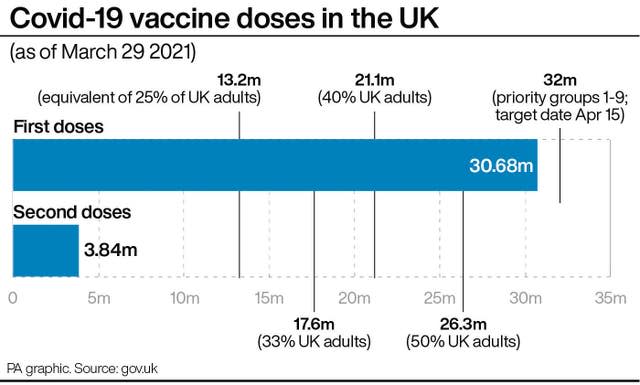Should I be worried about the AstraZeneca Covid-19 jab?
Germany is suspending use of the Oxford/AstraZeneca Covid-19 vaccine for people aged under 60 due to fears of a link with rare blood clots.
What has happened?
The German medicines regulator has reported 31 cases of a type of rare brain blood clot among the nearly 2.7 million people who received the AstraZeneca jab in the country.
It follows moves in several German regions, including the capital Berlin, to stop using the vaccine in younger people.
Nine of the 31 people suffering clots have died, and all but two of the cases involved women who were aged 20 to 63, Germany’s Paul Ehrlich Institute said. The two men were aged 36 and 57.
The concerns centre on cerebral venous sinus thrombosis blood clots, which stop blood draining from the brain properly.

Is the ban justified?
Several senior regulators, including the European Medicines Agency (EMA) and the UK’s Medicines and Healthcare products Regulatory Agency (MHRA), have said there is no evidence to suggest the vaccine has caused these rare blood clots.
While a definitive link cannot be ruled out, they say the benefits of having the vaccine far outweigh any potential risks and both have declared it “safe and effective”.
This view is echoed by the World Health Organisation, which has urged countries to continue using the jab.
Covid itself can cause an increased risk of blood clots – a risk that is far higher than any posed by the vaccine.
The EMA and MHRA are continuing to monitor cases but say millions of doses of the AstraZeneca vaccine have been administered with very few reports of clots.
The International Society on Thrombosis and Haemostasis has also recommended that all eligible adults continue to receive their Covid-19 vaccine.
What about other countries?
Canada has suspended use of the AstraZeneca jab in people under 55 due to the concerns raised in Europe.
It cited evidence from Europe suggesting the risk of blood clots is now potentially as high as one in 100,000 people.
France already limits the use of the jab to those aged over 55.
But several European countries are using the AstraZeneca vaccine without such restrictions following the EMA’s ruling that it is safe. These include Italy, Greece, Belgium, the Netherlands, Sweden and Portugal.
In Italy, Prime Minister Mario Draghi and his wife, who are both 73, have received their first dose of AstraZeneca to show confidence in the vaccine.
Are UK scientists worried?
No. Scientists in the UK have been largely unconcerned and say there is no data to directly link the vaccine with blood clots.
Professor Adam Finn, from the University of Bristol and a member of the Joint Committee on Vaccination and Immunisation, said on Monday: “It remains uncertain whether the vaccine caused these cases and the mechanism by which these blood clotting abnormalities come about and why they affect this very small proportion of individuals has still not been properly worked out.
“What seems clear is that the risks to individuals in age groups currently being targeted for vaccination in the UK of death and of dangerous blood clots are greatly reduced by receiving this vaccine, because it reliably prevents severe Covid-19 which definitely causes many deaths and blood clots and which poses a much larger and clearer risk than any possible rare vaccine side effects that may exist.
“Right now the biggest risk to our lives and livelihoods in this country and throughout the world is Covid-19.”
Dr Peter English, immediate past chairman of the British Medical Association’s public health medicine committee, added: “If you look for excesses of cases in a wide range of rare conditions, you will find some, due to the play of chance.
“There is no evidence that these cases are caused by vaccination, rather than simply associated with it, in people who would have had such conditions anyway.
“Any decision to withhold the vaccine will directly cause excess, avoidable Covid-19 deaths.”

What has AstraZeneca said?
AstraZeneca has previously said its own review found no evidence of an increased risk of pulmonary embolism, deep vein thrombosis or thrombocytopenia, in any defined age group, gender, or in any particular country.
In clinical trials for the jab, the number of clotting incidents was small and “lower in the vaccinated group” than in those who were unvaccinated, it added.
The firm said international regulators had found the benefits of its jab outweigh any risks.
However, it said it will continue to analyse its database to understand “whether these very rare cases of blood clots associated with thrombocytopenia (low blood platelet count) occur any more commonly than would be expected naturally in a population of millions of people”.

 Yahoo Finance
Yahoo Finance 